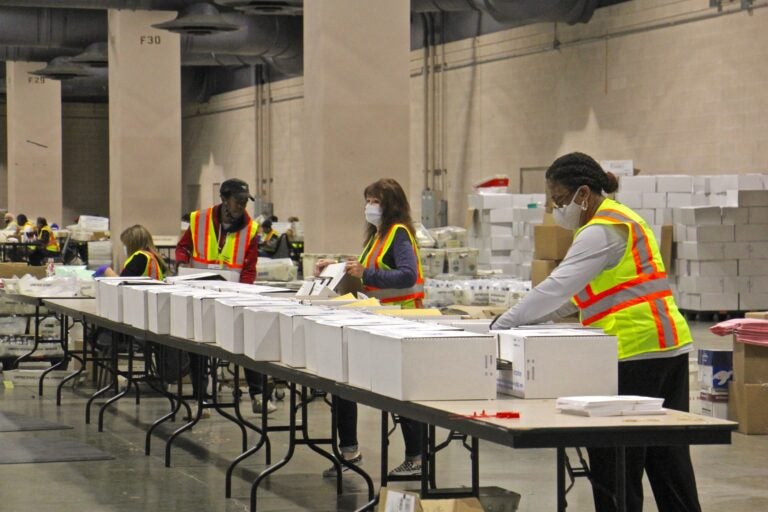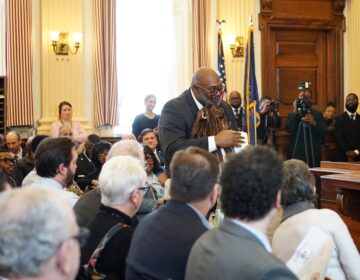Defending the 2020 election has cost Pennsylvania millions. Here’s how the state is preparing for this election
The baseless election fraud claims are requiring Pennsylvania to retain more lawyers — subsequently exhausting much needed resources and costing taxpayers millions.

Workers at the Pennsylvania Convention Center prepare election boxes that will go out to polling places on Election Day. (Emma Lee/WHYY)
Pennsylvania’s position as a key battleground state has made it the target of a concentrated number of election-related lawsuits.
Since the unfounded election fraud claims started rolling in following former President Donald Trump’s loss in 2020, the Keystone State has been hit with more than 30 lawsuits. For comparison, the state faced only seven election-related lawsuits in 2016.
The complexity and sheer volume of election lawsuits is requiring the state to develop its legal bench with in-house lawyers from the Office of General Counsel and the Office of Attorney General as well as outside legal help — at a high cost to taxpayers.
In 2020 alone, the Pennsylvania Department of State spent more than $3.3 million defending against these cases. While acting Pennsylvania Secretary of State Leigh Chapman couldn’t provide an up-to-the-minute count of how much money the state is spending this election cycle, she projects that the state is on pace to, at the very least, match the costs of 2020.
“We’re continually seeing an increase in litigation. Just two months before the November election, we are currently in the process of litigating cases related to mail-in voting and other issues related to election administration in Pennsylvania,” Chapman said.
Pa. agencies inundated by election-related open records requests
Lawsuits are just the tip of the iceberg. Attempts to undermine and discredit the election process have evolved beyond the courtroom.
The Department of State has seen an influx of Right-to-Know Law requests related to the election.
So far this year, the agency has received more than 135 election-related Right-to-Know requests. At this same time in 2021, the agency had only received 100 such requests. In 2020, the number was even smaller — only 70 requests. In 2019, the number of open records requests was a measly 26.
Chapman noted that this is part of growing a trend across Pennsylvania as well as the rest of the country. She said that the office is doing everything that it can to respond promptly — including bringing on a full-time open records officer to handle the requests.
Understaffed and overwhelmed, Chapman said that the election lawsuits and Right-to-Know Law requests are taking away much needed time and resources away from their ordinary operations.
“It’s something that we are keeping an eye on because we need to make sure that we have enough resources to do our day-to-day job,” Chapman said.
Where these election challenges are coming from
Chapman believes that it is important to contextualize the spike in lawsuits and Right-to-Know requests with historic changes in the way people cast their vote.
In 2019, Pennsylvania passed Act 77, which allowed any Pennsylvania resident to vote by mail for any reason. Chapman said that the practice has been “wildly popular” with more than 5.3 million votes cast by that method to date.
She also highlighted the fact that the state spent $90 million to update voting systems.
“All that change led to litigation,” Chapman said.
How Pa. is preparing to defend the midterm election
With that in mind, the Pennsylvania Department of State is working on several fronts to prepare for the midterm elections in November.
Voter education and expectation setting is near the top of the agenda. From radio announcements and text messages to ads on the Pennsylvania Turnpike and social campaigns, the agency wants everyone to know “how they can register to vote, cast their ballot, and have it counted.”
Chapman’s goal is also to provide clarity surrounding the counting process.
“What’s more important is for us to have an accurate count, and that election officials need to do their job and count every vote and because of that, it’s likely that we won’t have results on election night,” Chapman said.
Chapman and other state officials are also working alongside the 67 counties to make sure that they are prepared for the election. The agency holds office hours every other week to answer the questions from county officials regarding litigation, requests, or even new laws.
However, the white whale of ballot processing remains just out of reach. Pre-canvassing, which is the process of sorting through mail-in ballots before Election Day, is not allowed In Pennsylvania. Currently, county workers can only begin the process prior to Election Day.
“One thing that we continue to advocate for in the legislature is additional time for pre-canvassing. We want to be like states like Florida that have election results on election night and in order to do that, the legislature needs to pass legislation that would give us at least two weeks of pre-canvassing time,” Chapman said.
So far, the majority-GOP state Legislature has not advanced legislation that would allow earlier pre-canvassing.
WHYY is your source for fact-based, in-depth journalism and information. As a nonprofit organization, we rely on financial support from readers like you. Please give today.








